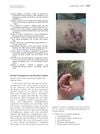 21 citations,
September 2015 in “Journal of the European Academy of Dermatology and Venereology”
21 citations,
September 2015 in “Journal of the European Academy of Dermatology and Venereology” Yellow and orange colors are important for diagnosing certain skin conditions.
 21 citations,
February 2013 in “Clinics in Dermatology”
21 citations,
February 2013 in “Clinics in Dermatology” New treatments for advanced skin cancer are improving patient outcomes, but drug resistance and finding the right treatment combinations are still big challenges.
 July 2023 in “bioRxiv (Cold Spring Harbor Laboratory)”
July 2023 in “bioRxiv (Cold Spring Harbor Laboratory)” The mesenchyme can start hair growth, but the exact signal that causes this is still unknown.
 160 citations,
January 2014 in “Seminars in cell & developmental biology”
160 citations,
January 2014 in “Seminars in cell & developmental biology” Early development of hair, teeth, and glands involves specific signaling pathways and cellular interactions.
 47 citations,
June 2019 in “Nature Communications”
47 citations,
June 2019 in “Nature Communications” Noncoding dsRNA boosts hair growth by activating TLR3 and increasing retinoic acid.
 25 citations,
October 1976 in “The BMJ”
25 citations,
October 1976 in “The BMJ” A woman showed neurological symptoms from psittacosis linked to bird exposure, improving after antibiotic treatment.
 14 citations,
February 2020 in “Stem Cells International”
14 citations,
February 2020 in “Stem Cells International” Umbilical cord cells safely improve healing in long-term nonhealing wounds better than a placebo.
 14 citations,
May 2013 in “American Journal of Physiology-endocrinology and Metabolism”
14 citations,
May 2013 in “American Journal of Physiology-endocrinology and Metabolism” Removing myelin protein zero-like 3 in mice leads to better metabolism and resistance to obesity.
 10 citations,
April 2013 in “Veterinary dermatology”
10 citations,
April 2013 in “Veterinary dermatology” A new skin disease in four Labrador retrievers responded well to immunosuppressive treatment.
 7 citations,
November 2006 in “Pediatric Dermatology”
7 citations,
November 2006 in “Pediatric Dermatology” A newborn with congenital syphilis had unusual hair loss possibly caused by the infection.
 4 citations,
January 2016 in “JAMA Dermatology”
4 citations,
January 2016 in “JAMA Dermatology” Compression therapy improved ankle movement, reduced leg swelling, and lessened pain in patients with venous leg ulcers.
 2 citations,
January 2011 in “Elsevier eBooks”
2 citations,
January 2011 in “Elsevier eBooks” Early treatment of acne is crucial to prevent scarring and psychological effects.
 2 citations,
September 2010 in “Journal of the Dermatology Nurses’ Association”
2 citations,
September 2010 in “Journal of the Dermatology Nurses’ Association” Transplant patients on immunosuppressive medications have a higher risk of skin cancer, and managing this involves balancing medication with cancer risk.
 April 2023 in “bioRxiv (Cold Spring Harbor Laboratory)”
April 2023 in “bioRxiv (Cold Spring Harbor Laboratory)” Sweat gland development involves two unique skin cell programs and a temporary skin environment.
 April 1963 in “Archives of Dermatology”
April 1963 in “Archives of Dermatology” Dermatological conditions are complex and treatments often have mixed results.
 44 citations,
December 1991 in “Annals of the New York Academy of Sciences”
44 citations,
December 1991 in “Annals of the New York Academy of Sciences” EGF and FGF help hair growth by affecting cell differentiation and fiber growth.
2 citations,
September 2018 in “JAAD case reports” A rare type of skin cancer with mucosal involvement was partially treated but eventually relapsed.
 August 2024 in “Clinical Cosmetic and Investigational Dermatology”
August 2024 in “Clinical Cosmetic and Investigational Dermatology” Enzyme injections can effectively treat epidermoid cysts without surgery.
 October 2023 in “Pediatric dermatology”
October 2023 in “Pediatric dermatology” Middle Eastern patients with epidermolysis bullosa show specific genetic mutations linked to different types of the disease.
76 citations,
October 2000 in “Journal of the American Academy of Dermatology” Follicular mucinosis can be an early sign of aggressive mycosis fungoides.
14 citations,
March 2018 in “The American journal of case reports” People with the same genetic mutation for Woodhouse-Sakati syndrome can have different symptoms.
 3 citations,
August 2010 in “Anais brasileiros de dermatologia/Anais Brasileiros de Dermatologia”
3 citations,
August 2010 in “Anais brasileiros de dermatologia/Anais Brasileiros de Dermatologia” A rare genetic disease caused severe, worsening hair loss from early childhood with poor treatment results.

A 72-year-old man was diagnosed with a rare skin form of Rosai-Dorfman disease after years of misdiagnosis.
 275 citations,
March 1999 in “Journal of The American Academy of Dermatology”
275 citations,
March 1999 in “Journal of The American Academy of Dermatology” Chemotherapy can cause various skin reactions, with hair loss being the most common, and proper diagnosis and treatment of these reactions are important.
 65 citations,
January 2013 in “Cochrane library”
65 citations,
January 2013 in “Cochrane library” Some systemic treatments work for nail psoriasis but can have serious side effects.
 50 citations,
May 2019 in “Drugs”
50 citations,
May 2019 in “Drugs” Cannabinoids may help treat chronic and chemotherapy-induced neuropathic pain, but more research is needed to confirm their effectiveness and safety.
 32 citations,
February 2008 in “Journal of the American Academy of Dermatology”
32 citations,
February 2008 in “Journal of the American Academy of Dermatology” KFSD is a genetic disorder causing hair loss and skin issues, with no effective treatment.
 19 citations,
May 1984 in “Digestive diseases and sciences”
19 citations,
May 1984 in “Digestive diseases and sciences” A young woman's Cronkhite-Canada syndrome improved on its own after she gave birth.
 13 citations,
October 2013 in “The Journal of Dermatology”
13 citations,
October 2013 in “The Journal of Dermatology” Cepharanthine may help hair growth by increasing IGF-I in scalp cells.
 4 citations,
October 2012 in “Expert Review of Dermatology”
4 citations,
October 2012 in “Expert Review of Dermatology” Dermoscopy greatly improves melanoma diagnosis and reduces unneeded surgeries.



























